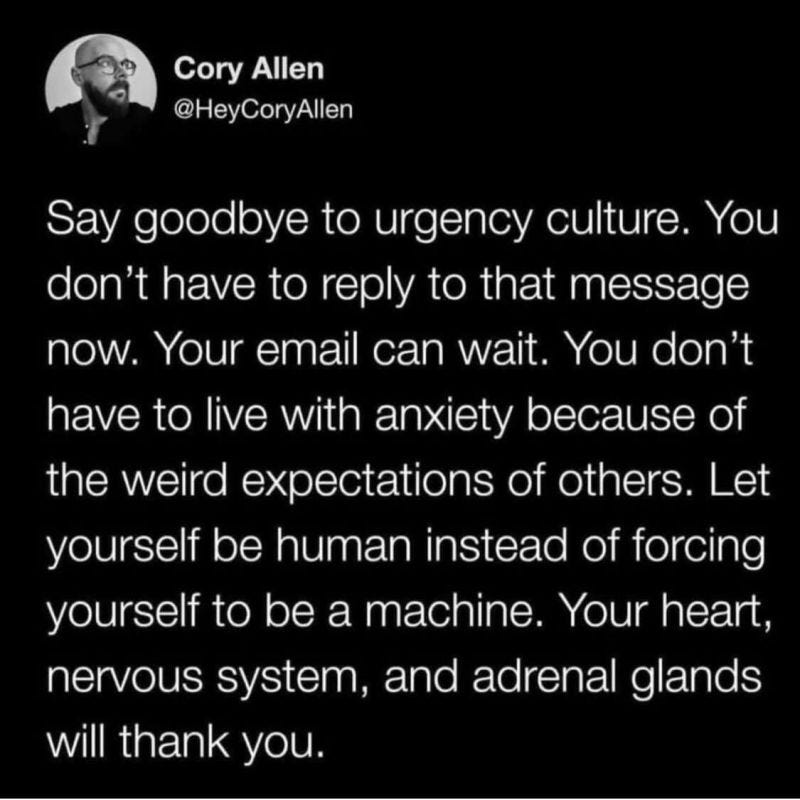Normalize Being Difficult to Get a Hold Of
This bizarre entrepreneur who makes $7M a year is onto something
Being always busy is low status.
Saying you’re busy is the equivalent of saying “I have no money in my bank, am behind on car payments, licked the floor of a public toilet, and went to a br0thel last night.” It’s disgusting, and successful people look down on busy people.
Entrepreneur Justin Welsh wrote the headline of this article. He lives it.
I’ve known Justin for a few years. He makes ~$7M USD a year and barely works. Every time I attempt to contact him, it’s difficult. You’ve got to follow up multiple times and go through a virtual assistant.
It’s this bizarre feeling where you never know if he will reply.
And when he does you stand on your seat and scream “Justin, Justin, Justin!” as if you’re a cheerleader at a football game. It’s euphoric.
Would Justin make $7M a year if he was easy to reach? I doubt it. It’s weirdly part of his formula for success.
It’s time for you to become chronically unavailable.
Being always available secretly means this…
You don’t value your time.
When I worked in banking everyone was “on call.” You could reach them while on holiday or over the weekend. Their kid could be singing their first song at a school musical and they’d walk out to answer your useless call about KPIs.
I hated this. So I rejected this way of operating and it got me into trouble.
One night our IT systems blew up. Everyone jumped on an 11 PM call on a Saturday night. I was the only person amongst 1000s of employees who didn’t show up.
I went to bed at 9 PM that night with my phone off.
On Monday morning the fill-in-boss roasted me (my actual boss had already quit). “How dare you Denning! You should have been on the call.”
Me: “I work in sales. IT outages have nothing to do with me. Did you call any clients at 11PM on a Saturday?”
Boss: “Well, no, but that’s beside the point.”
People who value their time don’t jump when the market or a boss says jump. They have boundaries. They know most problems solve themselves if you delay replying.
Most of us aren’t emergency room nurses who need to be on call. We can slow down and chill the f*ck out if we want to. We can go counter-culture and do the opposite of the hustle culture that corporations have jackhammered into our brains.
Fast responses make you feel never-ending anxiety
Responding fast means you always have an open loop.
Open loops mean the brain can’t rest, so what you get is anxiety. It’s why most people live in a constant state of anxious incompetence and make more errors as a result.
The fastest people to respond are the least successful.Slower replies allow you to think deeply and send a meaningful response (if at all). As author James Altucher says, emails are a suggestion but not an obligation.
Slow down response times to buy back your time.
Always being connected to the internet fries your brain
Some people always have a device in their hands the way a baby has a dummy.
(Don’t forget the average adult is a child in an adult’s body that attends a workplace daycare every day that pretends to care about them and forces them do boring work.)
But being always connected is exhausting. The notifications alone are enough to clog up your brain and destroy your creativity and imagination.
Instead of gaps of silence or boredom, these critical moments in time are now replaced with looking at a device to escape. We open our phones looking for something to do. And there’s always something to do by design.
People have outsourced so much of their thinking to their devices that they don’t think anymore.
They just live mindlessly like robots and don’t really know why they exist. It’s only when they lose their jobs or someone they love dies, that they get a nasty wake-up call and think again. The internet has drowned us in information.
Writer Sahil Bloom explains the issue (and opportunity) with this:
“Dopamine from information gathering is a dangerous drug.
Your entire life will change the moment you stop looking for more information and start acting on the information you already have. Get your dopamine from action.”
Being high status helps you sell better
Being always available makes you sound desperate and needy.
Living this way makes you less persuasive because you come across as low status. This means if you run a business you sell less, or if you work a job your sales numbers are lower. Some of you will say “I don’t work in sales.”
Wrong.
We’re all salespeople whether we realize it or not.
If you’ve ever had a romantic partner, you had to sell yourself. If you did a bad job of selling, you probably spent a lot of time going on endless dates or screaming “What’s wrong with men/women… they’re all sons of @#$%^#$.”
Every aspect of life requires some level of persuasion.
Especially writing. You have to persuade people to read. Then keep reading. Then become a subscriber. Then maybe even buy a subscription. If you refuse to sell, you become a starving artist waiting for a lucky break that will never come.
To sell people better, it’s your obligation to:
Make people value your time
Present yourself as a scarce resource with limited bandwidth
Let people know you don’t do maybes, only yes or no
Here’s how to become hard to reach, so you can become more successful:
Let’s channel our inner Justin Welsh with these action steps.
1. Delay all responses by 48 hours
Slowing down response times starts to slowly change your mindset around being available. It’s the first step to a new form of productivity.
2. Start the day creating, not reacting
Dedicate the first part of your day to creation.
By default this pushes all of the requests of your time to later in the day. How you start the day is how you end the day. Creation helps your mind work. It makes you feel good. And you get the real work done.
3. No more inbound calls
My phone is set to do not disturb 24/7. Only my wife can bypass that setting because she’s in my favorites.
This means:
No more call surveys
No more surprise calls
No more cold calls/salespeople
No more calls from the government
All notifications are turned off on all my devices, too.
4. Deep work over shallow work
Shallow work is done in an open plan office full of distractions with the phone on and new emails popping up every few minutes that you react to.
Deep work is done in a flow state. There are no distractions. You focus for 4-hour blocks. You chase your obsession, not work done out of obligation. You use your creativity and imagination most of all.
Spend most of your time doing deep work.
5. Implement digital free weekends
No devices. No TV. Just you, the family, and nature.
Spend it outdoors or away from the internet. In my case, I spend my weekend with a 2 year old toddler away from the worries of business and social media.
6. Dare to one day hire a virtual assistant
… Then make all your communication go through them. You only pick up the scraps. There’s a process to handle every type of email or phone call.
Now you’ve reached the ultimate stage of an F U life. Enjoy it.
Urgency culture is dying. It must die.
The new definition of wealth is having free time, being unavailable, going off-grid, and reclaiming your mental health.
If you’re not already living this way, it’s time to build a life that enables you to.
I send this email weekly. If you would also like to receive it, join the 134,000+ other smart people who absolutely love it today.
👉 If you enjoy reading this post, feel free to share it with friends! Or feel free to click the ❤️ button on this post so more people can discover it on Substack 🙏




Last year I was on vacation in Thailand. Three weeks only for myself. My boss said, "Denis, when you're not here, you're not here. People have to live with it."
So one day I received a text message on WhatsApp from a colleague asking to please quickly read a research paper I was going to co-author. He'd sent me the paper per email. F*ck. I knew I didn't want to open the damn inbox but didn't want to make the colleague wait for several weeks.
I opened it and instantly regretted it - there were 90+ emails, at least 10% of which required my attention. I'll make an effort to stay the hell away from my email and WhatsApp next time I'm on vacation.
I love that you take the time to love (heart) your own work.